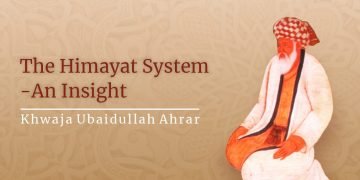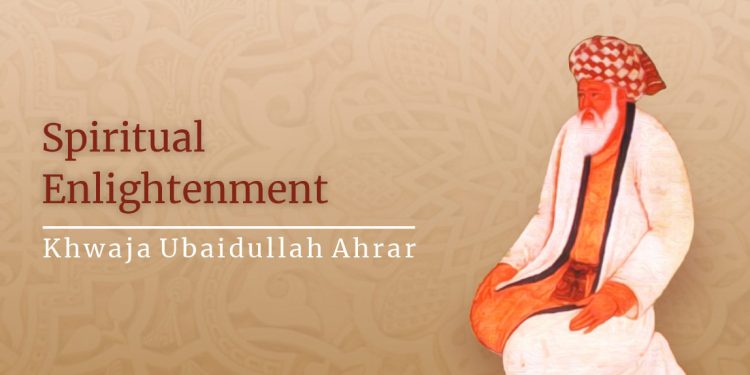Khwaja Ahrar’s Spiritual Enlightenment Understanding the real meanings of spirituality and its various levels is not that simple, it wasn’t that easy for even a spiritual leader to explain them to those who yearn for this journey. Khwaja Ubaidullah Ahrar stands out among all the spiritual leaders for being the epitome of enlightenment, whoever asked him about the mystiques of a spiritual leader, he would explain it in en entrancing, comprehensible and compelling manner. He would narrate his experiences, give examples and quote sayings of saints to validate his point. The result was the countless number of Naqshbandi followers, many of those wanted to attain the attributes of a spiritual wanderer.
Khwaja Ubaidullah Ahrar once said, that a person should be well-aware of his spiritual state at all times, whatever signs that comes to him are from Allah, one should know that a spiritual traveler can’t attribute his own self for the God’s manifestations. His golden words were, “To comprehend is to know one’s travel companion.”
On the subject of immersion and annihilation by the Sufis who experience ecstasy, Khwaja Ahrar was of the view that this doesn’t sum up the spiritual prosperity or progression. The spiritual progress, in fact, can be achieved through hard work while immersion forbids a person to indulge in any sort of work. According to him, the real state of immersion or self-extinction is a manifestation that would appear in the life hereafter.
Sheikh Muhammad Parsa opined, “Remembrance is, in fact, Allah’s demonstration to His being through His quintessence”, the one who is remembering is the speaker who has a mark of honor from God, and this can’t be comprehended without chanting remembrance and developing watchful awareness in heart which is called “Muraqaba.”
On this Khwaja Ahrar was of the view that “The God’s path isn’t revealed to a person through his strength, it is manifested through his weakness.” He further explained it that weakness doesn’t mean physical or moral weakness; it means a person admitting to the fact that no one knows Allah best but Himself, all his qualities, mysteries are best known to Him. He is the creator, he knows what He should endow to someone, therefore the wealth, beauty, wisdom everything that He blesses a human with is not a person’s own accomplishment, it is a blessing, a gift given by the God, it’s His property and He can take it back when and if He desires to do so.
Khwaja Ahrar elucidated the concept of togetherness and separateness given by Shaikh Abu Bakr al-Wasiti. He said togetherness comes when a person accredits God’s providential support in all his endeavors; separateness, on the other hand, is a person accrediting his subjugation to his own skills.
He explained it further that if someone comprehends this point, his life in this world would become better and he would be saved in the hereafter as well. In the spiritual quest, understanding self-extinction is really important for a traveler. It can bring him God’s love and blessings.
Khwaja Ahrar once explained Sufism in the following example
The Sufi society can make the most of example set by Mawlana Rukn ad Din Khwafi. He said he didn’t expect any reward for his work or deeds except for one. While traveling in the desert with Shaikh Zain ad-Din Al Kulan he cleaned a stone by rubbing his face onto it to the venerable Shaikh so that he could clean himself after the toilet rituals. He further added that if a Sufi saint has rubbed his face on a wall, people are supposed to pass by it with absolute polite decorum.
More on Sufi Community, Khwaja Ahrar once said
“Friendship with strangers nurtures indifference in the heart and dejection in the spirit.” He went on to elucidate that point by mentioning Bayazid who seemed to be infected with that kind of gloominess. On asking the reason, he said I feel an outsider is nearby, he should be ousted. The search was made but no one was found, he asked the searchers to look for anything that he might have left behind after they found that and threw it away the ambiance of positivity and serenity was restored.
Khwaja Ahrar enlightened his followers by saying
“Even the inanimate things get affected by the behavior and personality of humans.”
He made this point to explain that a prayer offered at a place where evil has been practiced is different than the one where good has been done. That is why a prayer offered at Ka^ba gives much peace and contentment to one’s heart than the prayer performed at any other place.
If a person does bad, wrongs someone, the place gets affected by that act. The whole aura absorbs the negativity and evil of a person who practices immorality.
About praising the Oneness of God, Khwaja Ahrar opined
“In our time, the assertion of Oneness of God has reached to a thought-provoking state, people would wander in streets and markets, come across some pretty faces and say, we are appreciating the beauty of Allah. This is such shameful and misguided behavior.”
Khwaja Ahrar mentioned Bayazid to explain a Dervish’s connection with Allah, he said Bayazid used to say for three decades I have talked to Allah and listened to Him, though the people get the notion I was making a conversation with them. This is God’s favor on the ones He loves, it doesn’t matter how the world perceives their acts and appearance but they know they have a strong connection with their Lord. They could talk to Him whenever they want and He gives the manifestations of Him being the most avid listener, giver and the one who knows the best.
Khwaja Ahrar corrected many concepts related to spirituality and religion in those times. He would always weigh his arguments in the balance of rationality, that was the reason his argument had a swaying effect on the listeners. Many people who had wrong notions about Sufism and spirituality benefited from Khwaja Ahrar.


















